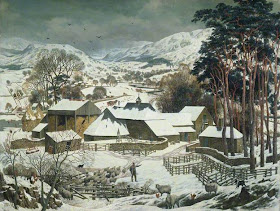James McIntosh Patrick, "Winter in Angus" (1935)
Winter in Spring
Winter is over, and the ache of the year
Quieted into rest;
The torn boughs heal, and the time of the leaf is near,
And the time of the nest.
The poor man shivers less by his little hearth,
He will warm his hands in the sun;
He thinks there may be friendliness in the earth
Now the winter is done.
Winter is over, I see the gentle and strange
And irresistible spring:
Where is it I carry winter, that I feel no change
In anything?
Arthur Symons, The Fool of the World and Other Poems (1906).
James McIntosh Patrick, "Arbirlot Mill, near Arbroath"
"Where is it I carry winter, that I feel no change/In anything?" Well, perhaps a clue lies here:
The Soul's Progress
It enters life it knows not whence; there lies
A mist behind it and a mist before.
It stands between a closed and open door.
It follows hope, yet feeds on memories.
The years are with it, and the years are wise;
It learns the mournful lesson of their lore.
It hears strange voices from an unknown shore,
Voices that will not answer to its cries.
Blindly it treads dim ways that wind and twist;
It sows for knowledge, and it gathers pain;
Stakes all on love, and loses utterly.
Then, going down into the darker mist,
Naked, and blind, and blown with wind and rain,
It staggers out into eternity.
Arthur Symons, Days and Nights (1889).
Yes, I know: Whew! But I wouldn't say that Symons's vision is uniquely bleak. For instance, Arthur Schopenhauer and Thomas Hardy came to similar conclusions, so he is in good company. Bear in mind: such a vision doesn't render the World and our existence any less wondrous. In fact, it may heighten our appreciation for what we have stumbled into . . . until we disappear back into the mist.
James McIntosh Patrick, "The Ettrick Shepherd" (1936)



"The torn boughs heal."
ReplyDeleteNice.
:-)
ReplyDeleteShelley: yes, I agree, especially coming after "Quieted into rest." Thank you for visiting again.
ReplyDeleteMr. Holt-Wilson: I'll take that as a sign that you enjoyed the post (I think). Thank you for stopping by.
ReplyDeleteI greatly enjoyed Symons' first, where he wonders where he carries winter within. it's important to keep one's senses fresh and be able to greet the seasons with renewed joy, isn't it?
ReplyDeleteto allow one's sensibilities to atrophy so that one takes nature's ways for granted, is death in life.
thank you for sharing this poem.
anj: I'm happy to hear from you again.
ReplyDeleteThat's a lovely way of putting it. The seasons do have a way of transforming us, don't they? And you are right: we have to be receptive to them in order for that to occur.
As always, thank you very much for your thoughts.
When we think of the melancholy poets of the 1890s, we tend to think of British poets, but America has its own dark, brooding poet of the 1890s: E.A. Robinson (1869-1935). He'd write poetry until he died. Frost called Robinson "The Prince of Heartachers." Here is a poem Robinson wrote in the 1890s:
ReplyDeleteThe Pity of the Leaves
Vengeful across the cold November moors,
Loud with ancestral shame there came the bleak
Sad wind that shrieked, and answered with a shriek,
Reverberant through lonely corridors.
The old man heard it; and he heard, perforce,
Words out of lips that were no more to speak—
Words of the past that shook the old man’s cheek
Like dead, remembered footsteps on old floors.
And then there were the leaves that plagued him so!
The brown, thin leaves that on the stones outside
Skipped with a freezing whisper. Now and then
They stopped, and stayed there—just to let him know
How dead they were; but if the old man cried,
They fluttered off like withered souls of men.
"A little bit of dream-laden, death-haunted melancholy is good for the soul from time to time."
ReplyDeleteThis would make an excellent sig block.
Anonymous: thank you very much for the poem by Robinson, which I hadn't seen before. I have been meaning to read his poetry for years, but have never done so -- I am only familiar with the usual anthology pieces. I agree: this poem fits well with those of the English Nineties poets.
ReplyDeleteIt also sounds a little bit like a precursor of Frost's "An Old Man's Winter Night," doesn't it?
Thank you again.
Mr Rickard: Hah! I don't use one, but maybe I should. I suppose that I was channelling my inner Schopenhauer when I wrote that. (A very pale imitation of the original, of course.)
ReplyDeleteThanks very much for visiting again, and for the suggestion!